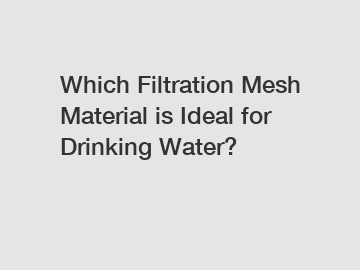Which Filtration Mesh Material is Ideal for Drinking Water?
Which Filtration Mesh Material is Ideal for Drinking Water?
When it comes to choosing the ideal filtration mesh material for drinking water, the answer lies in considering several key factors. Water is an essential resource for humans, and ensuring its purity and safety is of utmost importance. The choice of filtration mesh material can have a significant impact on the effectiveness of water purification systems and, ultimately, on the quality of drinking water.
The first factor to consider is the pore size of the filtration mesh material. It determines the size of contaminants that can be effectively removed from the water. A mesh material with smaller pore size can capture more particles and provide better filtration. However, it may also restrict the flow of water and lead to a slower filtration process. On the other hand, a mesh material with larger pore size may allow for a faster flow rate but may not effectively remove smaller contaminants.

The second factor to consider is the material's resistance to chemical and physical degradation. Water often contains various impurities, including chemicals and organic matter, which can potentially damage the filtration mesh material. It is crucial to choose a material that is resistant to corrosion and can withstand prolonged exposure to water without deteriorating. Materials like stainless steel and polypropylene are known for their durability and resistance to degradation, making them ideal choices for filtration mesh.
Another important consideration is the material's ability to remove specific contaminants. Different filtration mesh materials have varying levels of effectiveness in removing specific impurities such as sediment, bacteria, viruses, heavy metals, and chemicals. For example, activated carbon mesh is highly effective in removing organic compounds and chlorine, while ceramic filters excel in trapping bacteria and parasites. Considering the specific contaminants present in the water source will help in selecting the most suitable filtration mesh material.
Additionally, the cost and availability of the filtration mesh material should be taken into account. Some materials, such as stainless steel, may be more expensive but offer long-term durability and reliability. Others, like polypropylene, are more affordable but may require frequent replacement. The availability of the material is also essential, as it ensures easy access to replacements and maintenance services.
In conclusion, the ideal filtration mesh material for drinking water depends on several factors, including pore size, resistance to degradation, ability to remove specific contaminants, cost, and availability. Considering these factors will help in selecting a material that ensures effective water purification, providing clean and safe drinking water. It is crucial to prioritize the quality and safety of drinking water, as it directly impacts human health and well-being.
The company is the world’s best Ceramic Honeycomb Screen, ceramic foam filters for casting, Fiberglass Filtration Filter supplier. We are your one-stop shop for all needs. Our staff are highly-specialized and will help you find the product you need.
231
0
0

Comments
All Comments (0)